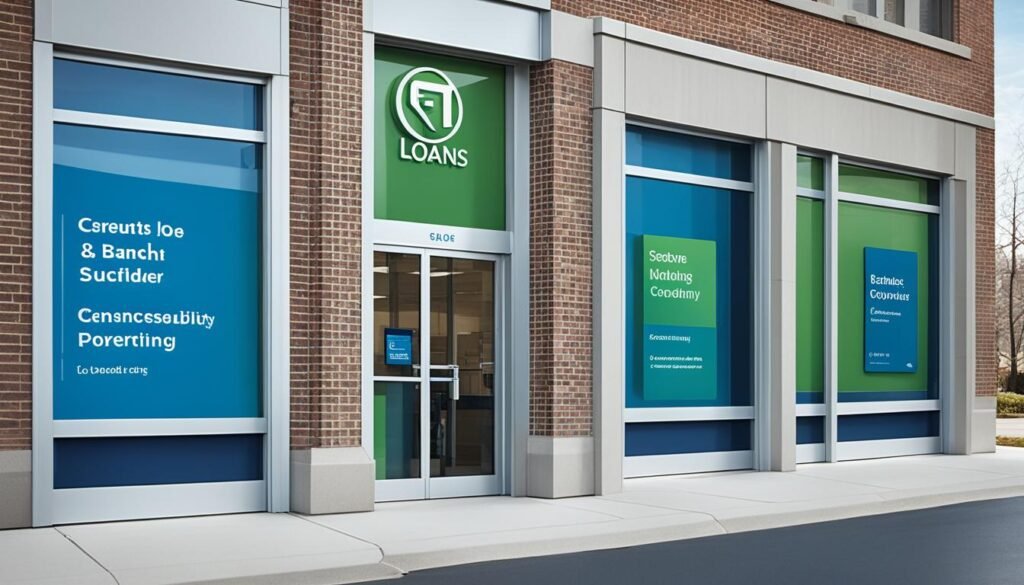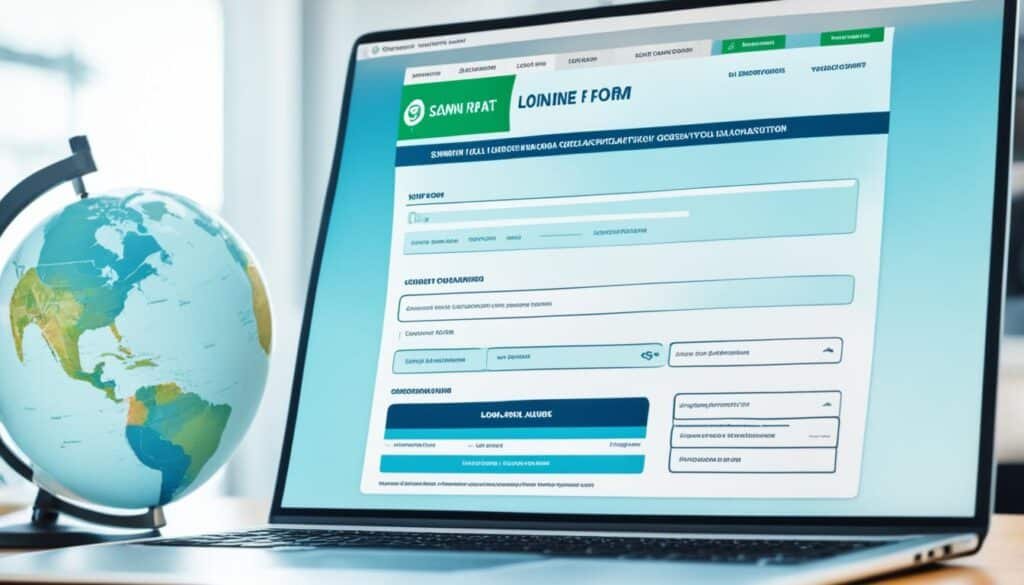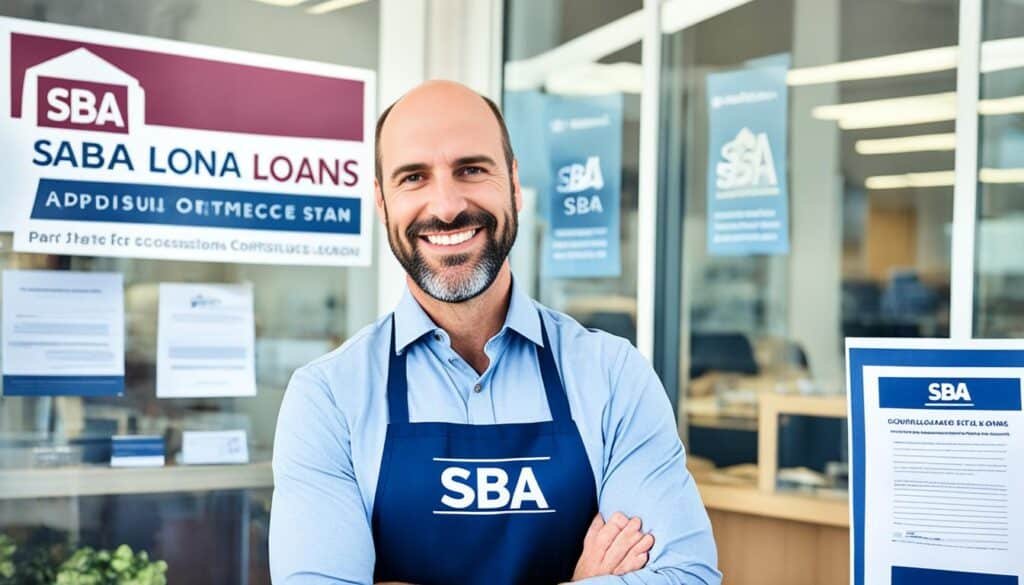Are you a self-employed business owner looking to finance your business? Self employment loans can provide you with the capital needed to achieve your short- and long-term business goals. Whether you’re a freelancer, sole proprietor, or independent contractor, these loans can help cover your operating expenses, invest in marketing or equipment, and expand your business.
When it comes to self employment loans, there are various options available to suit your needs. From traditional bank loans to online business loans, business lines of credit, SBA loans, microloans, business credit cards, and personal loans, you have a range of choices to explore.
To find the best loan for your self-employed business, it’s important to compare the different types of loans and lenders. Each option has its own advantages and considerations, depending on factors such as interest rates, accessibility, flexible spending, repayment terms, and eligibility requirements.
Are you ready to explore your financing options? In this article, we will walk you through the different types of self employment loans and help you understand which option may be the best fit for your business.
Key Takeaways: Self Employment Loans
- Self employment loans are essential for financing the growth and operations of self-employed businesses.
- Different types of loans are available, including bank loans, online business loans, business lines of credit, SBA loans, microloans, business credit cards, and personal loans.
- It’s important to compare lenders and loan terms to find the most suitable financing option for your business.
- Consider factors such as interest rates, accessibility, flexible spending, and repayment terms when evaluating loan options.
- Ensure that you meet the eligibility requirements of the loan option you choose.
Compare Loans for Self-Employed Business Owners
When it comes to financing your self-employed business, there are various loan options available. Understanding the different types of loans and lenders can help you find the best fit for your specific needs.
Bank Loans: Low Rates
**Compare loans** offered by traditional banks if you’re looking for **low interest rates**. Banks typically have lower rates compared to other lenders. However, keep in mind that banks may consider self-employed businesses riskier. They often have stricter requirements, such as a credit score of 670 or higher and at least one to two years in business. If you have a strong credit history and established business, bank loans can provide affordable financing options.
Online Business Loans: Accessibility
**Self-employed business owners** looking for more accessible loan options should consider **online lenders**. Online lenders often consider alternative data when reviewing a business’s credit, allowing them to take into account factors beyond traditional credit scores. This can be beneficial if you don’t have an extensive credit history or if your business is relatively new. Online lenders may also approve loans for freelancers or independent contractors who have been in business for at least six months and have lower credit scores, sometimes as low as 450.
Business Lines of Credit: Flexible Spending
If you’re looking for flexibility in borrowing and spending, **business lines of credit** are a good option. They provide a revolving credit line that you can draw from as needed, similar to a credit card. This makes them ideal for covering short-term expenses and managing cash flow fluctuations. Online lenders often offer business lines of credit with lower interest rates starting at 8 percent, making them an accessible choice for self-employed business owners.
SBA Loans: Long Repayment Terms
If you need **long repayment terms** and lower interest rates, consider **SBA loans**. These loans are partially guaranteed by the Small Business Administration, allowing lenders to offer more favorable terms to borrowers. Self-employed business owners can benefit from SBA loans, which provide repayment terms of up to 25 years. However, SBA loans have stricter requirements, including a personal credit score of 650 or higher, at least two years in business, and a minimum annual revenue of around $200,000.
Microloans: Underserved Communities
For self-employed business owners in underserved communities, **microloans** can be a valuable financing option. These smaller loans cater to underrepresented business owners, including minority-owned businesses and those in low-income areas. They are often approved for small businesses and can be used for working capital, inventory, and supplies. SBA microloans, for example, can go up to $50,000, providing essential funding for self-employed individuals.
Business Credit Cards: Short-term Lending
If you need short-term financing for your self-employed business, **business credit cards** can be a convenient option. They allow you to cover expenses quickly and offer perks such as cash back or travel points. Business credit cards are suitable for freelancers, independent contractors, and sole proprietors, helping to build business credit history. However, it’s important to note that using personal debt for business expenses is not recommended for small business owners with separate finances.
When comparing **loans for self-employed business owners**, it’s crucial to consider your specific needs, such as interest rates, repayment terms, accessibility, and flexibility. Take the time to research different loan options and lenders. Consider factors such as your credit history, business performance, and long-term goals. By comparing loans and finding the best fit for your business, you can secure the financing you need to fuel growth and success.
| Loan Type | Interest Rates | Repayment Terms | Accessibility | Features |
|---|---|---|---|---|
| Bank Loans | Low | Varies | Medium | – – – |
| Online Business Loans | Varies | Varies | High | – – – |
| Business Lines of Credit | Medium | Short-term | High | – – – |
| SBA Loans | Low | Long-term | Medium | – – – |
| Microloans | Varies | Short to medium-term | Medium | – – – |
| Business Credit Cards | High | Short-term | High | – – – |
Bank Loans: Best for Low Rates

When it comes to securing financing for your self-employed business, one of the top considerations is finding a loan with low rates. Bank loans are often the go-to choice for entrepreneurs seeking competitive interest rates. Compared to other lenders, banks can offer some of the most affordable borrowing costs.
However, it’s important to note that banks may have stricter requirements for self-employed businesses. They may perceive these ventures as riskier, which can make the loan approval process a bit more challenging. To qualify for a bank loan, you typically need a credit score of 670 or higher, and a proven track record of one to two years in business.
In some cases, self-employed borrowers may consider approaching small local or regional banks. These institutions may have higher approval rates for entrepreneurs and offer more personalized services. While their rates may not differ significantly from larger banks, the community-oriented approach can make the lending experience more seamless.
When considering bank loans for self-employed individuals, it’s crucial to assess your business’s financial health and weigh the benefits of low interest rates against the potential challenges of meeting stricter requirements.
Bank Loans Comparison:
| Bank | Interest Rate | Minimum Credit Score | Years in Business |
|---|---|---|---|
| ABC Bank | 4.5% | 670 | 2 |
| XYZ Bank | 5.2% | 680 | 1 |
| DEF Bank | 4.8% | 660 | 2 |
Note: The above table is for illustrative purposes only. Actual rates and requirements may vary depending on the bank and borrower’s creditworthiness.
Online Business Loans: Best for Accessibility

When it comes to financing your self-employed business, online business loans offer accessibility options that traditional lenders may not provide. These loans utilize alternative data and have less strict lending requirements, making them a viable choice for self-employed individuals.
Unlike traditional lending institutions, online lenders consider personal bank statements and bill payments that may not be reflected in your personal or business credit scores. This means that even if your credit score doesn’t meet the typical requirements, you still have options to secure the funding you need.
One of the advantages of online business loans is their willingness to approve startups and freelancers with as little as six months in business. This makes it easier for new ventures to gain access to capital without the lengthy business history required by traditional lenders.
Additionally, online lenders may be more forgiving when it comes to low credit scores. Some lenders offer loans with no specific business history requirement or credit scores as low as 450. This makes it possible for self-employed individuals with less-than-perfect credit to still obtain the financing they need to grow their business.
Overall, the accessibility of online business loans opens up opportunities for self-employed individuals who may not meet the rigid criteria set by traditional lenders. With alternative data considerations and more flexible requirements, online loans can be a lifeline for self-employed business owners.
Example Online Business Loan Lenders:
| Lender | Minimum Credit Score | Business History Requirement |
|---|---|---|
| Lender A | 450 | No specific requirement |
| Lender B | 500 | At least 6 months |
| Lender C | 550 | At least 1 year |
Business Lines of Credit: Best for Flexible Spending

When it comes to financing your business, flexibility is key. That’s where business lines of credit come in. A business line of credit offers a unique combination of credit card and loan features, providing you with the freedom to borrow from a predetermined credit limit whenever you need it.
Business lines of credit are an excellent choice for self-employed business owners who require funds for short-term expenses. With this financing option, you can easily cover day-to-day operating expenses or unexpected costs that may arise. Unlike traditional loans, business lines of credit do not require you to wait for loan approval, enabling quick access to much-needed funds.
Online lenders frequently offer business lines of credit with short repayment terms, starting as low as 8 percent interest rates. This makes them an attractive choice for self-employed individuals who prefer shorter loan durations. Additionally, the convenience and accessibility of online lending platforms allow you to easily apply and manage your line of credit without the hassle of visiting a physical bank branch.
Business lines of credit are commonly used for various business purposes, from purchasing inventory and equipment to funding marketing campaigns and managing cash flow fluctuations. With a business line of credit, you have the freedom to allocate borrowed funds as you see fit, providing the financial flexibility necessary for growing and sustaining your business.
Key Features of Business Lines of Credit:
- Flexible borrowing – borrow from a predetermined credit limit
- Quick access to funds without waiting for loan approval
- Short repayment terms
- Competitive interest rates starting at 8 percent
- Ideal for day-to-day operating expenses and short-term needs
- Funds can be used for various business purposes
If you’re a self-employed business owner looking for financing solutions that provide flexibility and convenience, a business line of credit may be the perfect fit for your needs. This type of financing gives you the freedom to manage your expenses as they arise and helps ensure that you have the necessary capital to support the growth and success of your business.
Explore the various online lenders that offer business lines of credit and compare their terms and rates to find the best option that aligns with your specific requirements.
- “What Is a Business Line of Credit?” Business News Daily. Accessed January 20, 2023. https://www.businessnewsdaily.com/10966-best-line-of-credit-for-freelancers.html
- “7 Alternatives to Traditional Business Loans.” Nav. Accessed January 20, 2023. https://www.nav.com/business-credit-cards/alternative-lending-options-3573
SBA Loans: Best for Repayment Terms

When it comes to self-employment loans, SBA loans stand out as one of the best options for repayment terms. These loans are partially guaranteed by the Small Business Administration, allowing self-employed borrowers to benefit from longer repayment periods of up to 25 years. The extended repayment terms offered by SBA loans provide self-employed individuals with the flexibility to stretch out their payments, freeing up capital that can be used for other essential business needs.
It’s important to note that while SBA loans offer attractive repayment terms, they do come with stricter requirements compared to other loan options. To qualify for an SBA loan, self-employed borrowers typically need to have a personal credit score of 650 or higher. Additionally, the business should have at least two years of operation and a minimum annual revenue of around $200,000. These eligibility criteria ensure that SBA loans are granted to businesses with a proven track record and financial stability.
For underserved communities that may face challenges meeting the standard SBA loan requirements, there are community development financial institutions (CDFIs) that offer SBA loans with lower eligibility requirements. These institutions aim to support entrepreneurs and small business owners in underserved areas by providing them with access to essential funding options.
To summarize, SBA loans are a great fit for self-employed individuals who prioritize favorable repayment terms. The extended repayment periods of up to 25 years allow borrowers to manage their cash flow effectively and allocate capital towards other critical business needs. While SBA loans do have stricter requirements, the option of CDFIs provides more accessible financing opportunities for underserved communities.
| Loan Type | Repayment Terms |
|---|---|
| Bank Loans | Varies, typically shorter terms |
| Online Business Loans | Varies, shorter terms common |
| Business Lines of Credit | Shorter terms, typically revolving credit |
| SBA Loans | Up to 25 years |
| Microloans | Varies, smaller loan amounts, shorter terms |
| Business Credit Cards | Varies, typically shorter terms |
| Personal Loans | Varies, typically shorter terms |
Microloans: Best for Underserved Communities

Microloans are a valuable financing option for underserved communities, including minority-owned businesses and those located in low-income areas. These small business loans typically have maximum loan sizes of around $100,000 or lower, making them accessible to entrepreneurs who may not qualify for larger loans from traditional lenders.
One of the key providers of microloans is the Small Business Administration (SBA), which offers microloans of up to $50,000. These loans are often approved for small businesses that are in need of working capital, inventory, or supplies to support their operations.
Microloans play a vital role in empowering individuals and communities that have historically faced challenges in accessing affordable financing options. By supporting underserved businesses, microloans contribute to local economic development and job creation, fostering a more inclusive and resilient economy.
“Microloans are powerful tools for driving economic growth and social impact in underserved communities. By providing access to capital, these loans empower entrepreneurs and create opportunities for small businesses to thrive.”
The flexibility offered by microloans makes them particularly well-suited for the unique needs and circumstances of underserved businesses. The loan proceeds can be used to address a variety of financial needs, from purchasing equipment and machinery to launching marketing campaigns or hiring additional staff.
Furthermore, microloans often come with reasonable repayment terms and interest rates, helping borrowers in underserved communities manage their financial commitments without undue strain. This allows them to make steady progress towards their business goals while building a positive credit history.
Supporting Underserved Communities Through Microloans
Microloans have proven to be an effective tool for supporting the growth and development of underserved communities across the United States. Here are some of the key benefits and features of microloans:
- Accessible financing option for minority-owned businesses and those in low-income areas
- Smaller loan sizes ensure accessibility for entrepreneurs who may not qualify for larger loans
- Flexible use of loan proceeds to address various business needs
- Reasonable repayment terms and interest rates to support long-term financial sustainability
- Contribution to local economic development and job creation in underserved communities
Microloans provide a pathway to financial empowerment for underserved communities and business owners who have been historically disadvantaged. By supporting these entrepreneurs and their businesses, microloans promote economic equity and contribute to building prosperous and vibrant communities.
Business Credit Cards: Best for Short-term Lending
When it comes to short-term financing, business credit cards offer a convenient and flexible solution. These cards are specifically designed to cover expenses that can be paid off quickly, making them ideal for self-employed individuals and small business owners.
One of the key advantages of business credit cards is the perks and rewards they offer. From cash back on purchases to travel points and discounts, these rewards can provide additional value to your business. Plus, many business credit cards come with introductory offers such as waived annual fees or 0% interest rates for a specified period.
Another benefit of business credit cards is their ability to help build business credit history. By making timely payments and managing your credit responsibly, you can establish a positive credit history for your business. This can be crucial when applying for other forms of financing in the future.
It’s important, however, to exercise caution when using personal debt for business expenses. While business credit cards can be useful, it’s recommended to keep personal and business finances separate. This not only ensures better financial management but also protects your personal credit in case of unforeseen business circumstances.
Here is a comparison table highlighting the key features and benefits of popular business credit cards:
| Business Credit Card | Annual Fee | Introductory APR | Rewards Program |
|---|---|---|---|
| Capital One Spark Cash | $0 for the first year, then $95 | 0% for the first 12 months | Cash back on all purchases |
| American Express Business Gold | $295 | 0% for the first 6 months | Membership Rewards points |
| Chase Ink Business Preferred | $95 | 0% for the first 12 months | Ultimate Rewards points |
Types of Loans for the Self-Employed
For self-employed individuals, various loan options cater to their unique financial circumstances. Firstly, there are traditional bank loans, requiring thorough documentation of income and assets. SBA loans, backed by the Small Business Administration, offer favorable terms but necessitate a solid business plan. Alternative lenders provide flexibility but may charge higher interest rates. Home equity loans utilize property as collateral, ideal for entrepreneurs with substantial home equity. Peer-to-peer lending platforms connect borrowers directly with investors, often offering competitive rates. Lastly, personal loans, though typically carrying higher interest rates, provide quick access to funds without requiring business documentation.
Compare Personal Loans Options for Self Employed Borrowers
For self-employed borrowers, comparing personal loan options involves considering various factors. Traditional banks often require extensive documentation of income and assets, making approval more challenging. Online lenders offer greater flexibility and faster approval processes, but may charge higher interest rates. Peer-to-peer lending platforms connect borrowers with individual investors, potentially offering competitive rates based on risk assessment. Credit unions may provide more personalized service and lower rates, especially for members with established relationships. Ultimately, self-employed individuals should evaluate loan terms, interest rates, repayment flexibility, and eligibility requirements to find the most suitable option for their financial needs.
Tips to strengthen your loan application
To bolster your loan application, start by improving your credit score through timely bill payments and reducing debt. Prepare thorough documentation of your income, including tax returns and financial statements, to demonstrate stability and reliability. Reduce existing debt to income ratio by paying off outstanding loans or credit card balances. Provide collateral, such as property or assets, to secure the loan and reduce lender risk. Additionally, consider obtaining a co-signer with strong credit history to strengthen your application. Finally, maintain open communication with the lender, addressing any concerns promptly to increase your chances of approval.
Lenders that accept self-employment income
Several lenders are open to considering self-employment income when evaluating loan applications. Online lenders like Funding Circle and LendingClub specialize in small business loans, accommodating self-employed individuals. Some traditional banks, such as Wells Fargo and Bank of America, have specific programs tailored to entrepreneurs, accepting self-employment income documentation. Additionally, peer-to-peer lending platforms like Prosper and Upstart connect borrowers directly with investors, often considering alternative sources of income, including self-employment. Credit unions also frequently accommodate self-employed individuals, offering personalized service and flexible loan options. It’s essential to research and compare lenders to find the best fit for your self-employment situation.
Options For Self-Employed Loans
Self-employed individuals have various loan options tailored to their unique financial circumstances. Traditional bank loans require thorough documentation of income and assets but offer competitive rates. SBA loans, backed by the Small Business Administration, provide favorable terms with a solid business plan. Alternative lenders offer flexibility but may charge higher interest rates. Home equity loans utilize property as collateral, ideal for those with substantial home equity. Peer-to-peer lending platforms connect borrowers directly with investors, often offering competitive rates. Personal loans provide quick access to funds without requiring business documentation, though typically with higher interest rates.
How to get a personal loan as a self-employed borrower
As a self-employed borrower, securing a personal loan requires meticulous preparation. Start by organizing thorough documentation of your income, including tax returns, bank statements, and profit-and-loss statements, to demonstrate financial stability. Maintain a healthy credit score by paying bills on time and reducing debt. Research lenders that specialize in catering to self-employed individuals, such as online lenders or credit unions. Consider offering collateral, like property or assets, to increase your chances of approval and secure better terms. Additionally, having a co-signer with strong credit history can bolster your application. Lastly, be prepared to explain your business and income sources in detail to the lender.
Also Read: Steps To How To Become A Loan Officer Career Guide
Conclusion
Self-employment loans play a crucial role in financing the growth and operations of self-employed businesses. Whether you are a freelancer, sole proprietor, or independent contractor, there are various financing options available to meet your specific needs. From traditional bank loans to online business loans, business lines of credit, SBA loans, microloans, business credit cards, and personal loans, each option offers unique advantages and considerations.
When choosing the right financing option for your self-employed business, it is important to carefully evaluate lenders and loan terms. Consider factors such as interest rates, repayment terms, eligibility requirements, and funding speed. Comparing financing options will help you find the most suitable solution that aligns with your business goals and financial capabilities.
Whether you need capital for operating expenses, marketing initiatives, equipment investments, or business expansion, self-employment loans provide the financial support you need. With the right financing in place, you can fuel the growth and success of your self-employed venture and seize new opportunities.
FAQs
Q: What are self-employment loans?
A: Self-employment loans are financial products designed specifically for individuals who are self-employed and need funding for their business or personal expenses.
Q: How can I qualify for a self-employment loan?
A: To qualify for a self-employment loan, you will typically need to provide proof of income, such as tax returns or bank statements, to demonstrate your ability to repay the loan.
Q: What are the alternatives to personal loans for self-employed individuals?
A: Alternatives to personal loans for self-employed borrowers include secured personal loans, home equity loans, and home equity lines of credit.
Q: How can I apply for a personal loan as a self-employed person?
A: You can apply for a personal loan as a self-employed individual by completing a loan application with a lender and providing the necessary documentation to support your income and creditworthiness.
Q: Can I get a personal loan with bad credit as a self-employed borrower?
A: While it may be more challenging, some lenders offer personal loans to self-employed individuals with bad credit. However, the terms of the loan, such as interest rates and loan amounts, may be less favorable.
Q: What are the best personal loans for self-employed borrowers?
A: The best personal loans for self-employed borrowers are those that offer competitive interest rates, flexible repayment terms, and loan amounts that meet your business or personal financial needs.
Q: How do I compare personal loans for self-employed individuals?
A: When comparing personal loans for self-employed individuals, consider factors such as interest rates, fees, repayment terms, and loan amounts to find the loan that best suits your financial situation.
Source Links
- https://www.bankrate.com/loans/small-business/self-employed-small-business-loan/
- https://www.nerdwallet.com/article/small-business/self-employed-sba-loans
- https://www.pnc.com/insights/small-business/manage-business-finances/loans-for-self-employed-what-you-need-to-know.html
